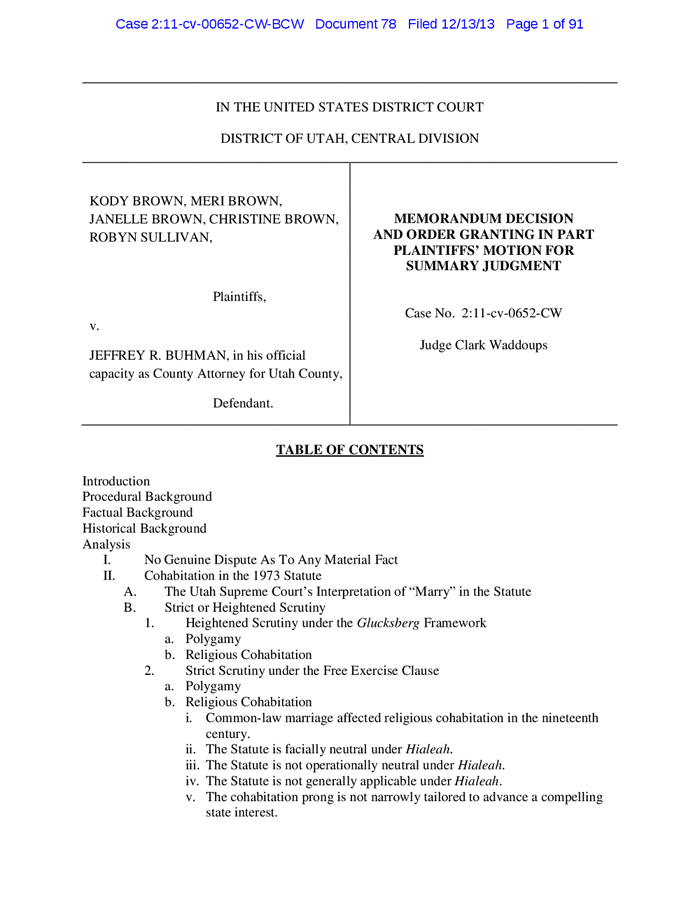
WASHINGTON — A federal judge struck down Utah's criminal ban on cohabitation between a married individual and another person not his or her spouse, a prong in the state's law against polygamy.
The Friday ruling did not address legal polygamy — actually being married to multiple people — but only what U.S. District Court Judge Clark Waddoups referred to as "religious cohabitation."
The court struck down the provision in the state's bigamy statute that criminalized a married person from "cohabit[ing] with another person" and limited another provision in the law to cover only those who make a "claim of entry into a legal union recognized by the state as marriage" and not those who enter into a religious union with no attempt to "elicit the state's recognition of marital statua."
Waddoups has been considering the case brought by the Browns — featured on TLC's Sister Wives television show — since 2011.
George Washington University law professor Jonathan Turley, who represents the plaintiffs, wrote on Friday night, "It is a moment in which all Utahans should take pride and celebrate not in the name of polygamy but of privacy. So congratulations to the Browns and to the people of Utah on a truly momentous day."
In beginning his 91-page opinion, Waddoups noted that the case "has weighed heavily on the court for many months."
At question was a 1973 law, passed when Utah rewrote all of its criminal laws, that read: "A person is guilty of bigamy when, knowing he has a husband or wife or knowing the other person has a husband or wife, the person purports to marry another person or cohabits with another person."
After detailing the history of the treatment of polygamy in Utah, Waddoups noted that the court deferred to a prior Supreme Court case foreclosing "any potential free exercise right to the actual practice of polygamy." This case, he explained, was about "religious cohabitation" in which the participants "make no claim to having entered into legal unions by virtue of their religious cohabitation."
Although Waddoups found no fundamental right either to polygamy or such "religious cohabitation," he did find that Utah's ban on religious cohabitation would violate the Free Exercise clause of the First Amendment because the point of that provision in the statute is "to infringe upon or restrict" people practicing religious cohabitation "because of their religious motivation."
In looking at privacy rights, Waddoups applied the reasoning of the Supreme Court's 2003 decision in Lawrence v. Texas striking down sodomy laws as unconstitutional, noting, "Consensual sexual privacy is the touchstone of the rational basis review analysis in this case, as in Lawrence."
The court found the provision here unconstitutional because Utah does not prosecute "[a]dultery, including adulterous cohabitation" but does prosecute "religious cohabitation." Of that, Waddoups wrote, "The court finds no rational basis to distinguish between the two, not least with regard to the State interest in protecting the institution of marriage …."
The other potential basis for upholding the provision was "serious concerns" about "the potential for injury and harm in closed religious polygamist communities," but Waddoups decided that "such crime can and should be prosecuted on its own independent basis under the Utah statutes specifically designated for those purposes."
As such, Waddoups concluded the religious cohabitation ban to be unconstitutional.
Similar constitutional concerns led him to conclude that the other provision in the bigamy ban — its language criminalizing "purport[ing] to marry another person" when already married — needed to be interpreted in a narrow way — only when a legal union is claimed — that would prevent it from criminalizing cohabitation-like situations.

